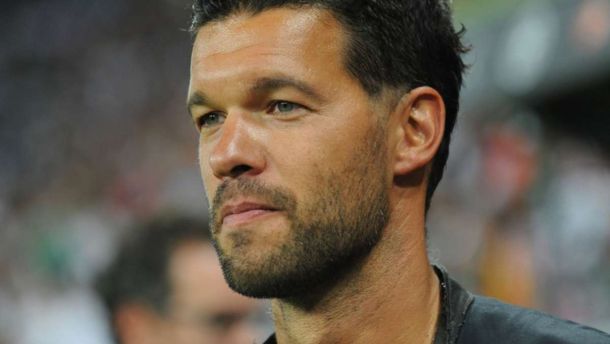It was a glittering career that never got the fairy-tale ending and send-off that it deserved. Michael Ballack - The man who had carried Germany for so long, the man who rose to prominence as 1.FC Kaiserslautern won probably the most unexpected Bundesliga title in recent memory, who made a good Bayer Leverkusen side in the early 2000’s great and conquered domestic leagues with aplomb whilst at Bayern Munich and Chelsea – Had become a pariah. In his second stint at the BayArena, nothing went according to plan, and as Raphael Honigstein so eloquently put it, the Capitano had become a subject of demontage.
There was no word in the German vocabulary that could describe the situation that he was in quite like that of the French, with demontage being the conspicuous and public destruction of the image and status of an important person. It is highly symbolic that a foreign word is needed to describe Michael Ballack and his plight at that time, for it was as if Germany had left him behind as the era of Joachim Löw, Bastian Schweinsteiger and, most tellingly, Philipp Lahm, came about. Neither Die Nationalmannschaft nor the Bundesliga have looked back ever since, and one wonders whether things would have turned out differently in the wider spectre of things had Kevin-Prince Boateng not shattered the leg of Michael Ballack in that ill-fated FA Cup final just weeks before the 2010 FIFA World Cup in South Africa was due to commence.
However, he should not be just remembered for a tragic end, but rather an incredible career in the midst of a barren generation of German football, where talent was at a premium and the Bundesliga was in a period of transition enforced by the lack of revenue and progressive planning. Born in East-Germany, Michael Ballack was sent to train with FC Karl-Marx-Stadt, or Chemnitzer FC as they are now known, at the tender age of 7. His father, Stephan Ballack, was himself a second-division footballer, and wanted his son to excel in the sport and surpass his own achievements. Thus the future captain of Die Nationalmannschaft honed his skills, hour after hour, until he could out-perform his peers whilst developing the ability to use both his feet with equal authority, unusual for such a young player. He immediately took to central midfield like a duck to water, and consequently earned his first professional contract in 1995, earning the nickname Der Kleine Kaiser, in reference to Germany and Bayern Munich legend Franz Beckenbauer. In terms of team success, his two professional seasons with Chemnitzer FC were not too successful, with relegation from the 2.Bundesliga in the first being followed by a failure to gain promotion from the multi-tiered regional third division. However, Michael Ballack himself had won many admirers with his performances.
Described by many as an 'unvollendeter', or unfulfilled person, Michael Ballack knows as much – Or even more – Of failure than success
It was when Otto Rehhagel signed him for newly-promoted 1.FC Kaiserslautern in 1997 that his career really started taking off, with Die Roten Teufel eventually going on to win the Bundesliga in an incredible season full of surprises as they became the first-ever newly-promoted team to win the title. Michael Ballack made 16 appearances during the season, but became an ever-present the following campaign as 1.FC Kaiserslautern made a memorable run to the quarter-finals of the UEFA Champions League, only to be knocked out by great domestic rivals Bayern Munich. As the summer came, numerous teams were on the tail of the 22-year-old star, with Bayer Leverkusen eventually securing his signature for a fee of €4.1 million, starting an era in his career that would define him as a player, and his future legacy, with Die Werkself. As Michael Ballack became the creative fulcrum for Bayer Leverkusen, they started challenging for titles, with the 2000 Bundesliga crown seemingly theirs for the taking as only a draw was needed against SpVgg Unterhaching on the last day of the season. It was not to be, though, as Michael Ballack himself scored an own-goal to relegate Die Werkself to a second place finish behind Bayern Munich.
The 2001-2002 season would end up being one that defines Bayer Leverkusen to this very day, and the Capitano just as much. It was the campaign that eternally and intrinsically linked Michael Ballack with second place – A prototypical nearly man. Die Werkself came agonizingly close to winning the treble, and becoming the first-ever German club to do so, only to be cruelly denied by Real Madrid in the 2002 Champions League Final, Borussia Dortmund in the Bundesliga and Schalke in the DFB Pokal. The legend of Neverkusen was born, and it is a tag that still smothers the club in the bitter taste of defeat more than a decade later. To add even more misery, Michael Ballack finished runner-up in the 2002 FIFA World Cup with Germany as well alongside club teammates Bernd Schneider, Carsten Ramelow and Oliver Neuville. The man himself had reached a new plateau in terms of performance, though, and earned international recognition for almost single-handedly hauling Die Nationalmannschaft through the World Cup alongside Oliver Kahn. He might have missed that all-important final through suspension, but Michael Ballack was a national hero, being voted German Footballer Of The Year as well as making the UEFA Team Of The Year.
It is no surprise that Bayern Munich, the most storied and decorated club in Germany, came calling soon after, with Michael Ballack rejecting interest from Real Madrid, among others, to join the Bavarians. What seemed to be a match made in heaven never really worked out as anticipated, with the player enjoying a terse relationship with the powers-that-be at Säbener Straße despite numerous domestic titles and cup wins. Respected figures within the Bayern Munich hierarchy like Uli Hoeneß, Karl-Heinz Rummenigge and Franz Beckenbauer criticized the national team captain for allegedly being a big-game ‘choker’, with Der Kaiser even going as far to say that he “saves his strength for prospective buyers” after a particularly under-whelming performance against Eintracht Frankfurt in the 2006 DFB Pokal Final. With the relationship between player and club well and truly on the rocks, Michael Ballack eventually joined Chelsea on a costless transfer in 2006 after the likes of Real Madrid and other elite European clubs were on his trail once again. It was at Stamford Bridge where the Capitano finally seemed to find his place, becoming a fan favorite almost instantly during a trophy-laden spell in the Premier League. However, the greatest prize in European football, the Champions League, continued to evade the German after the now-infamous Moscow 2008 final against Manchester United, while he experienced another international disappointment with Die Nationalmannschaft by virtue of losing the Euro 2008 final to a Fernando Torres-inspired Spain.
Michael Ballack once noted that he wanted to end his career at Chelsea - And that is what happened, in a way, as that leg-break against Portsmouth put a halt to his top-level footballing life even though he did not know it yet. After missing the 2010 FIFA World Cup, national team manager Joachim Löw cast aside his former mainstay as Philipp Lahm truly became the leader of the ‘new’ Germany, eventually leading Die Nationalmannschaft to the fourth world title that the nation so craved. The offer from the DFB to involve Michael Ballack in two friendly games to help him towards the milestone of 100 caps did not go down well, with their former captain and icon labelling this offer a “farce”. Another spell at Bayer Leverkusen promised to be a welcome return to once-familiar surroundings which could potentially help him return to his best, but it was not to be. The saying of ‘Never Go Back’ has never been as apt, as the former Capitano struggled to make any impact, and found himself left out in the cold on numerous occasions by then-Werkself manager Robin Dutt. When he finally decided to bow out from professional football, it was with a whimper rather than a roar, and one of the greatest and most complete midfielders of his generation met a cruel end.
"Balllack was the lone shining light in a leaden era of German football" - Udo Muras in Die Welt
Described by many as an unvollendeter, or unfulfilled person, Michael Ballack knows as much – Or even more – Of failure than success. It is worth noting that many of these ‘failures’ were not his fault, but rather stemmed from mediocrity around him, before the real boom in German talent. At almost all the clubs he represented, he was the star man who carried the team with routine brilliance, whilst being the scapegoat whenever anything went wrong. When among equals, like at Chelsea, failure was never as a result of his shortcomings, for how could it have been his fault when John Terry slipped in Moscow, for example?
You can bet your last dollar that Michael Ballack is not losing sleep over his near-misses, but rather remembering his numerous accolades and triumphs. Is it not time that the rest of the footballing world takes this approach as well? As Udo Muras once wrote in Die Welt, he was “the lone shining light in a leaden era”, after all.









































